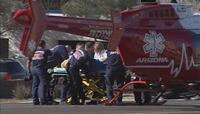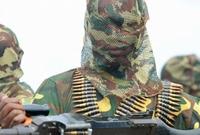-
UN indicts Hezbollah chiefs in Hariri assassination
Prosecutor for international tribunal investigating assassination of former Prime Minister Hariri files indictment with pre-trial judge; Nasrallah threatens to “cut off the hands” of anyone attempting arrest of Hezbollah members; turmoil grows following last week’s collapse of government
-
-
New report disputes Gitmo repeat offender rates
New report disputes U.S intelligence statistics on Gitmo recidivism rates; the director of national intelligence reports indicated that 13.5 percent of former detainees had returned to the battlefield, while the new study shows only 6 percent; new report cites each of the thirty-six confirmed and suspected terrorists by name; as of October 2010, 598 detainees have been released from Guantanamo
-
-
Materials for fertilizer bombs not regulated
Mixtures of ammonium nitrate and fuel oil (ANFO) are used in about 80 percent of all explosives used in North America each year, mostly in the mining and demolition industries; they were also used by Timothy McVeigh in Oklahoma City, and in insurgents’ IEDs in Iraq and Afghanistan; explosives-grade ammonium nitrate can be refined from commercial-grade fertilizers using processes readily found online; there are even YouTube videos that break down the process step by step; commercial grade fertilizers are not regulated; those states that address the issue typically require merchants to keep records of who buys what, but there are no limitations on who can buy what and no reporting requirements
-
-
Israel places troops on alert after Lebanon government falls
Lebanon plunged into crisis after Iran orders Hezbollah out of the government; Hezbollah’s move comes in anticipation of a UN tribunal’s decision to charge Hezbollah with masterminding and carrying out the 2005 assassination of Lebanon prime minister Rafik Hariri; by withdrawing its eleven cabinet ministers from the government, Hezbollah prevents the 30-member cabinet from acting on the UN tribunal’s determination (for that, the Lebanese constitution requires two-thirds cabinet majority); Iran is also acting to thwart a joint Saudi-Syrian effort to curb the growing power of Hezbollah — already the most militarily powerful group in the country; Israel’s military goes on alert
-
-
Officials warn of Arizona copycat attacks

Intelligence and law enforcement authorities informed U.S. lawmakers that they are monitoring for potential “copycat” attacks on lawmakers after the rampage in Arizona on Saturday; Rep. Peter King, chairman of the House Homeland Security Committee, said he expects to ask for a formal report on the shooting, addressing both the short-term concerns — including the likelihood of copycat incidents — and long-term issues with security; among the questions he wants answered, King said, are “Is this part of a larger movement? Is there any evidence he [the assailant] was motivated by organizational structure?” FBI director Robert Mueller said: “Given this tragedy, all logical precautions are in place to best ensure the safety of other public officials, but there is no information at this time to suggest any specific threat remains”
-
-
K-State doctoral dissertation examines food bioterrorism
Terrorist “chatter” and information gleaned from informants have led DHS to warn restaurants and hotels that terrorists are planning to use biological agents to contaminate food in readily accessible areas such as salad bars, cafeteria food displays, and more; a Kansas State graduate student writes a dissertation on how restaurants in country clubs protect themselves against this risk; he finds that they do not do much
-
-
U.K. consulate staff arrested in plot to bomb Jerusalem soccer stadium

Two Palestinian employees of the U.K. consulate general in East Jerusalem have been arrested over an alleged weapons plot; the U.K. Foreign Office spokeswoman said the two consulate employees were suspected of trying to obtain weapons for a rocket attack on Teddy Stadium, the home of the Beitar Jerusalem soccer team; the activities of the two consulate employees included systematically checking how best to launch rockets into the stadium while the stadium was crowded with people during a game; the launching of the rockets was to be carried out by two Hamas members, who were also arrested; questions raised in the U.K.. about vetting procedures at the consulate
-
-
Homegrown terrorists share characteristics, backgrounds
Since the 9/11 attacks, 90 people were arrested in the United States on terrorism charges for plots or attacks against the United States; a new study of the group finds that 44 percent had prior criminal records; 61 percent of the terrorism defendants attended some college, including three who earned doctoral degrees; 64 percent of those college-educated terrorism suspects were engineering majors
-
-
Al Qaeda aiming at soft targets in U.S.
DHS has ramped up its efforts to protect soft targets in the United States from terrorist attack this year; the department has issued bulletins to state and local law enforcement warning of the possibility terrorists could target religious gatherings, sports matches, and parades; the al Qaeda affiliate in Yemen puts out an online magazine in English that encourages U.S. residents to plan attacks. Suggestions include driving a truck into a crowded place or shooting into a restaurant
-
-
U.S. terror watch list streamlined, updated instantaneously

Now a single tip about a terror link will be enough for inclusion in the watch list for U.S. security officials, who have also evolved a quicker system to share the database of potential terrorists among screening agencies; a senior U.S. counter-terrorism official said that officials have now “effectively in a broad stroke lowered the bar for inclusion” in the list; the new criteria have led to only modest growth in the list, which stands at 440,000 people, about 5 percent more than last year; also, instead of sending data once a night to the Terrorist Screening Center’s watch list, which can take hours, the new system should be able to update the watch list almost instantly as names are entered
-
-
Terrorists' lone-wolf approach changes U.S. strategy
The year which coming to an end saw several terror plots in the United States foiled; these plots had two things in common: They were launched by lone-wolf attackers, and the FBI was in the middle of them; experts say to expect more undercover cases in 2011, because the FBI has clearly decided that the best way to battle the growing threat of homegrown terrorism in this country is to confront the suspects directly
-
-
Pirates winning war off Somali coast

The hugely expensive effort against the Somali pirates — a fleet of 40 warships from 30 countries is patrolling the waters near Somalia — has failed to slow down the rate of piracy; Somali attacks had soared dramatically in the past three years — from 40 attacks in 2007 to a reported 218 attacks last year; the Somali buccaneers are roaming over a much bigger territory and causing greater damage; the average ransom payment to the Somalis has doubled to $5 million; they are holding their hostages for up to 120 days — twice as long as in the past; they even used a hijacked freighter to attack a naval warship that was escorting supplies for African peacekeepers; the increasingly brazen pirates are currently holding 26 vessels and 609 hostages off the coast of Somalia; there is growing evidence that Somalia’s Islamic militants, including the feared al-Shabab radical group, are beginning to use piracy to raise money for their relentless rebellion against Somalia’s government
-
-
Former Guyana politician sentenced in JFK terror plot
Abdul Kadir, a former member of Guyana’s parliament, was sentenced to life in prison for participating in a plot to blow up the jet fuel supply tank system at JFK airport; the two other plotters are also of Guyanese origin: one, a former baggage handler at JFK, will be sentenced in late January; the other, Adnam Shukrijumah, has now been promoted to chief of al Qaeda’s global operations
-
-
Radical Islamist group kills 3 hospital employees in fresh Nigeria attack
A radical Islamist sect which has claimed responsibility for Christmas Eve bombings of Nigerian churches is behind the killing of three more people at a hospital, police said on Wednesday; the Boko Haram group — the name means “Western education is sinful” in the Hausa language spoken across northern Nigeria — is loosely modeled on the Taliban movement in Afghanistan; it demands the introduction of Islamic law across Nigeria
-
-
Islamic terrorism spreads in Nigeria

Nigeria, with a population of 150 million, is the most populous country in Africa, the eighth most populous country in the world, and the most populous country in the world in which the majority of the population is black; Nigeria’s population is almost evenly split between Muslims in the north and the predominantly Christian south; radical Islamic groups have increased their influence in the north by attacking law enforcement units and killing politicians, civil servants, teachers, and others who, according to the Islamists, stand in the way of the imposition of Sharia law in the north; in the past few years these groups have been pushing south, extending their terror campaign to central Nigeria, in the nation’s “middle belt,” where dozens of ethnic groups vie for control of fertile lands.
-
More headlines
The long view
What Does Netflix’s Drama “Adolescence” Tell Us About Incels and the Manosphere?
While Netflix’s psychological crime drama ‘Adolescence’ is a work of fiction, its themes offer insight into the very real and troubling rise of the incel and manosphere culture online.
